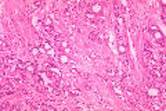Scientists Block Prostate Cancer Cells' Spread
Fighting inflammation could reduce metastasis, mouse study suggests.
|
E-mail this article
Subscribe to news
Printer friendly version
|

(SOURCE: Federation of American Societies for Experimental Biology, news release, April 8, 2008)
TUESDAY, April 8 (HealthDay News) -- Interrupting communication between cancer cells and cells that promote inflammation blocks an early step in prostate cancer cell's spread, a U.S. study finds.
According to researchers from Northwestern University's Feinberg School of Medicine, Chicago, the findings suggest new ways to control the spread of cancer. They also suggest that existing anti-inflammatory drugs might be useful in controlling inflammation-associated cancers.
Recent studies have suggested an association between chronic inflammation and cancers of the prostate, colon, stomach and liver, according to background information in the study, which was expected to be presented April 8 at the Experimental Biology 2008 meeting in San Diego.
In earlier studies, Dr. Paul Lindholm and his colleagues at Northwestern found that prostate cancer cells have a higher-than-normal density of macrophages and monocytes, cells that play an important role in immune responses and the development of inflammation.
In this new study, Lindholm and his team showed that monocyte-like cells stimulate prostate cancer cells' Nuclear Factor-kappaB -- a gene-regulating transcription factor that's able to stimulate gene activity. When the researchers blocked NF-kappaB activity, there was reduced cancer cell movement and invasion.
In the next phase, the researchers plan to study the effects of macrophages and inflammation and NF-kappaB-inhibiting treatments in mice with a model of invasive prostate cancer. They'll also extend these experiments to include anti-inflammatory drugs.
More information
The U.S. National Cancer Institute has more about metastatic cancer.
Copyright © 2008 ScoutNews, LLC. All rights reserved. 
HealthDayNews articles are derived from various sources and do not reflect federal policy. healthfinder.gov does not endorse opinions, products, or services that may appear in news stories. For more information on health topics in the news, visit the healthfinder.gov health library.